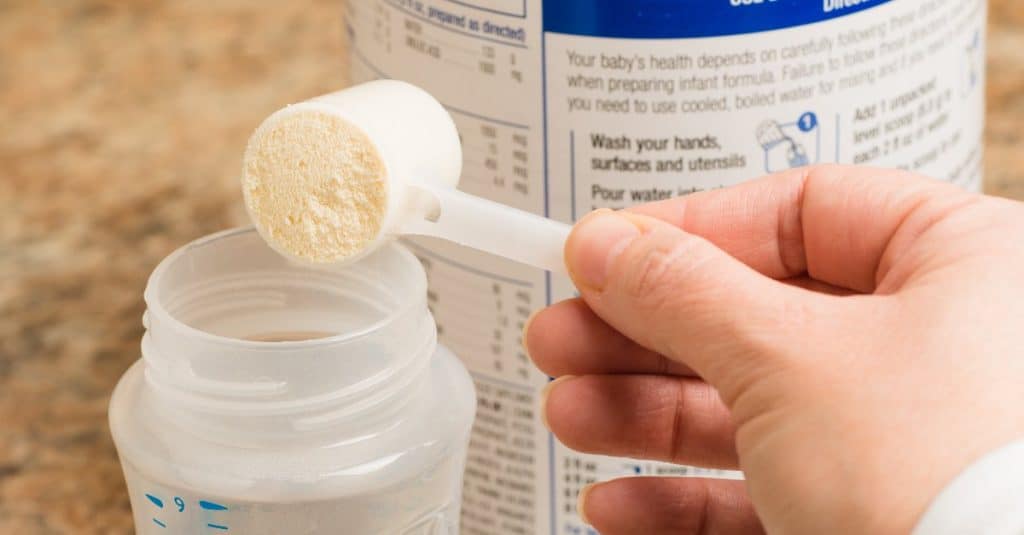Unlike adults who can get their nutrients from a variety of foods, babies can’t eat solids or drink anything other than milk, which is why they need specially formulated milk that is particularly nutrient-dense.
Can adults drink baby formula? Because baby formula is designed for babies, it is usually quite safe for adults to drink and is unlikely to cause any adverse health effects. Some adults even choose to drink formula for its purported health benefits, such as muscle building and extra nutrition.
At the end of the day, baby formula is just milk tweaked to fit a baby’s special dietary requirements. However, the nutritional value of baby formula might not be the most optimal for adults. Read through this article for a few health and safety facts about drinking baby formula.
Can Adults Drink Baby Formula? Facts to Know

For the first 6 months of your baby’s life, their source of nutrition will consist of either breastmilk, baby formula, or a combination of both. Baby formula is designed to closely mimic breastmilk and provide your baby with nutrition that supports their health and development.
-
Fat Content
Babies grow a lot in a relatively short amount of time; adults, on the other hand, not so much. As such, babies need much higher levels of fat in their diet. The American Academy of Pediatrics (AAP) recommends that babies receive 50% of their daily caloric intake from fats.
Healthy fats in your baby’s diet also support the rapid brain and nervous system development that occur within the first 2 years of life. This nervous system growth slows down by the time a person reaches their early 20s.
Around half of the calories present in baby formula comes from its fat component, which is derived from various plant-based sources. This high fat content, while important and beneficial for babies, is not quite as healthy for adults.
For adults, the Daily Reference Intake (DRI) for fat is just 20%-35% of total daily calories. Consistently consuming more than the DRI can increase your risk of becoming overweight and developing cardiovascular disease.
For people looking to put on weight, the high fat content in a baby formula may make it seem appealing. However, using baby formula as a weight gain supplement isn’t very realistic or sustainable.
You’d have to drink quite an absurdly large amount of formula for it to produce an increase in your weight. Consuming the formula in conjunction with several servings of high fat foods will make you gain weight, but any weight you gain will likely come from the fat in your food and not from the formula’s fat content.
-
Protein Content

Because of how quickly babies can grow on a diet consisting solely of milk, baby formula and breastmilk are occasionally touted as supplements for people looking to gain muscle rapidly.
Baby formula for healthy full-term babies has a protein content of around 2-2.5 grams/100 ml, while formula that is made for low birth weight or premature babies has a slightly higher content of around 3 grams/100 ml.
For an averagely active adult who is not pregnant or lactating, the DRI for protein is 0.8 grams per kilogram of body weight. For a person weighing 60 kilos, this translates to a DRI of around 50 grams a day.
This 60-kilo person would need to consume quite a large amount of baby formula to meet their DRI – 2 liters a day to be exact. In comparison, a standard adult protein powder formulation has 25-30 grams of whey protein per scoop.
The type of protein present also affects the makeup of baby formula. Cow’s milk-based baby formula contains whey and casein are present in a 60:40 ratio, similar to what is found in mature breastmilk.
Depending on your dietary goals, you may benefit from a protein supplement that has a higher concentration of one type of protein over the other. Some people may also have protein allergies and sensitivities to one type of protein or another, in which situation drinking regular baby formula would not be advisable.
-
Caloric Content
Prepared baby formula has a caloric concentration similar to that of breastmilk – around 20 calories per fluid ounce. For comparison, an ounce of unadulterated whole cow’s milk contains 17 calories.
Babies less than 6 months old need 35-50 calories a day for every pound they weigh. For a baby weighing 12 pounds, that would be a requirement of 420-600 calories a day. That adds up to 21-30 ounces of prepared formula each day.
Adult nutritional powders that are made to be used as meal replacements have a much higher caloric value than baby formula, corresponding to the higher energy needs adults have.
An 8-ounce serving of a nutritional beverage formulated for adults can have up to 400 calories, while typical baby formulas pack around 160 calories in a similarly sized serving. These are also usually more palatable and come in flavors such as vanilla, chocolate, and various fruit flavors that are more appealing to adults.
-
Extra Nutrition
Adults and babies need nutrients in different quantities. Baby formula is packed with nutrients, but they are in the amounts needed by babies, not adults.
A regular serving size of formula will not be enough to provide for an adult’s nutritional needs. For this reason, using baby formula as a nutritional supplement, let alone meal replacement in an adult diet doesn’t work.
Human Milk Oligosaccharides or HMOs are a special bioactive carbohydrate found in breastmilk that is sometimes synthesized and added to some baby formula brands such as Similac. These HMOs play an important role in building a baby’s immune system and gut microbiome.
Some studies have been conducted to examine the benefits of HMOs in the adult microbiome and immune system. While much research has yielded promising results, it is still a relatively new field of study that has yet to be approved by the US FDA.
To Wrap It Up
Adults can drink baby formula without any adverse effects, assuming they do not have sensitivities or allergies to any of the formula’s components such as lactose and different proteins. If you have some leftover formula from your baby’s most recent meal, go ahead and drink it or add some to your coffee.
Baby formula is made to support a baby’s nutritional requirements, not an adult’s. There are better options for adults who need dietary supplementation. Adult nutritional drink supplements found under brands like Ensure and Boost provide nutrition and energy in the amounts that adults need.
There is also the financial aspect of drinking baby formula to consider. Formula doesn’t come cheap, and there are supplements made for adult nutrition that will get you more bang for your buck than baby formula will.